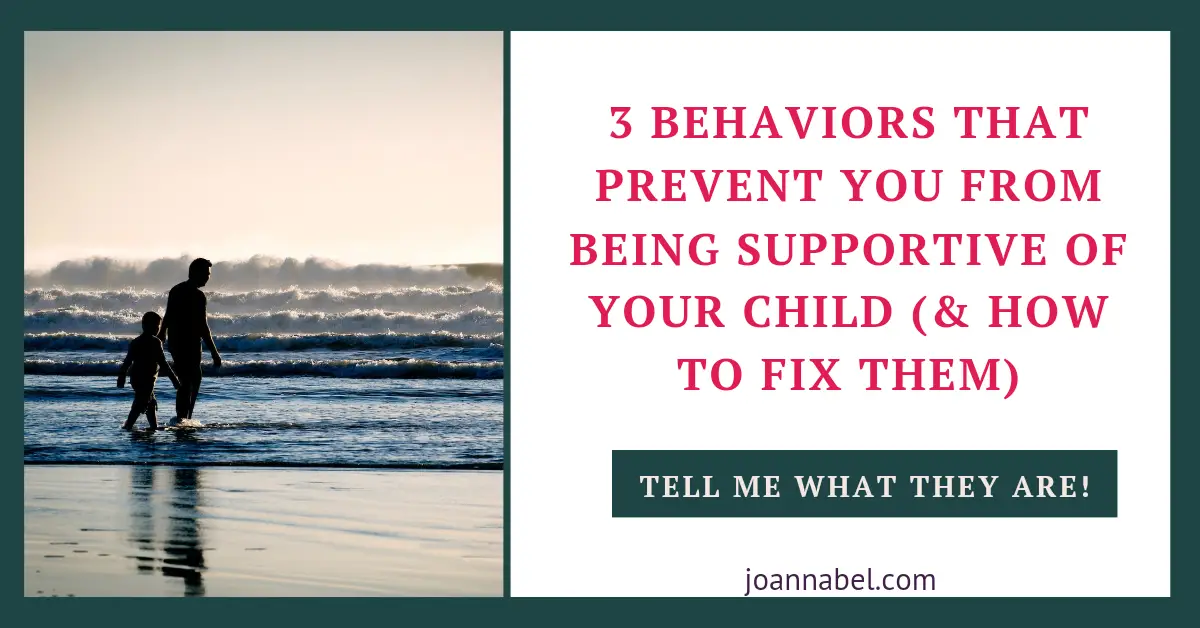Curious about the biggest mistakes parents make and want to uncover if you’re making some of them but don’t want to feel judged? Then this is the post for you.
Biggest Mistakes in Parenting
We’ll talk about 9 parenting mistakes, and I’ll point you to my other helpful resources if you want to dig a little deeper into some of them.
Plus, I’ll share the results of the research I’ve done that was focused on understanding to what extent a child’s right to participate is respected in court and administrative proceedings when it comes to one of the most important decisions in their lives (number 7).
So without further ado, let’s begin!
Note: Although I am a Clinical Social Worker, engaging with this website does not establish a professional social worker-client relationship. The information provided here is for general purposes only and should not be considered professional advice. While we strive to ensure accuracy and reliability, this content is not a substitute for professional guidance. For specific concerns, issues, or situations, it is essential to consult a qualified professional and present your situation. Read the full Disclaimer here.
9 BIGGEST PARENTING MISTAKES
PLEASE READ THE FOLLOWING NOTE BEFORE MOVING ON TO THE LIST OF 9 BIGGEST MISTAKES PARENTS MAKE:
Listing out biggest parenting mistakes is not about blaming anyone. It’s about raising awareness.
So, please, try not to take it the wrong way and instead of focusing on your flaws, focus on your strengths and think about the necessary steps you can take to make your situation or position better.
Some of the things I’ve numbered are not just the parent’s mistakes, because sometimes parents don’t have that much of an influence on how things occur.
Some of them are more about patterns than mistakes, and some are more about skills we didn’t get a chance to learn before than about mistakes.
What I’m suggesting is that you focus more on what I’m saying than on classifying what each of the points says about you.
Unless:
- you need an answer,
- you can’t tell whether you can influence and change some of them in your situation,
- or if more people need to do their part as well.
Now we can begin with our list, and remember, they’re not numbered by order of importance.
Let’s dive in!
1. NOT BEING RESPONSIVE TO THE CHILD’S NEEDS AND SUPPORTIVE
Being emotionally warm and responsive means that we’re respectful of and caring of children, which makes them feel like we’re honoring and cherishing them as human beings.
Some parents may have an underlying belief that being affectionate with a child will lead them to grow into spoiled people, so they restrain themselves from emotional warmth.
But I want you to reconsider if that’s true for you.
There’s no amount of affection and responsiveness that can “corrupt a child,” and if nothing else, there is a lack of affection, care, and empathy for children in this world, and many of them feel all alone.
Of course, affection by itself isn’t enough, but children value it greatly and remember this experience.
What can in fact create problems isn’t affection; it’s a disregard for setting limitations and modeling socially acceptable behavior and interaction.
As well as the lack of responsiveness and flexibility combined with inconsistency concerning discipline and disciplinary measures.
When I say lack of support, I mean lack of:
- understanding,
- compassion,
- well-balanced protection,
- constructive criticism (instead of constant criticizing and too high expectations)
- freedom to express themselves and to show who they are (instead of doing everything others expect of them).
The best way for you to be responsive to your child’s needs is to both show affection, support, and to provide guidance (structure, limitations, discipline, good role modeling, etc.).
This, in combination, has the power to create positive results.
My two helpful post for you if this is something you believe you should focus on more are:
2. NEGLECTING TO PROVIDE GUIDANCE AND A LACK OF CONSISTENCY IN PROVIDING DISCIPLINE
Children need your guidance and authority as well as discipline, but here I’m not talking about control, disciplinary measures, or punishment.
I’m talking about:
- providing a flexible structure,
- setting high (but not too high) expectations,
- setting clear and flexible limitations consistently, and
- consistency in responding to the misbehavior and in the implementation of disciplinary measures.
Problems with a child’s behavior often are the result of:
- lack of recognition of antisocial behavior
- lack of response to the antisocial behavior
- inconsistency in responding to antisocial behavior
- lack of proper modeling and inspiring prosocial and socially acceptable behavior
- modeling of antisocial behavior
- approval and enabling of antisocial behavior
- lack of supervision
- lack of flexibility combined with inconsistency in disciplinary measures as a response to misbehavior
- high control and a lack of flexibility combined with a lack of responsiveness to the child’s needs
- Too much permissiveness and protectiveness combined with a lack of responsiveness to the child’s needs
- Too much permissiveness combined with high inflexibility and harsh punishment once a parent eventually decides to respond to the misbehavior
- too soft or too rigid responses to problematic behavior
- high control, rigid structure and inflexibility, a lack of supervision, and a lack of emotional warmth and responsiveness.

Your authority matters so much in guiding children, but this authority doesn’t need to be based on fear; it’s enough that you’re firm with demands. But remember to stay kind to children.
Moreover, authority based on fear isn’t long-lasting; it often vanishes once you’re out of the room or out of sight. And you have to put in the effort to make them live up to your standards every time.
This is because with this leadership, you’re conserving all the power.
But if you’re authoritative, this sticks because, with this type of leadership, you’re leaving children with enough flexibility to be free and autonomous while also expecting and welcoming their responsibility and reliability.
This way, they will not need you to nudge and push them all the time.
Here are related useful post for you:
3. NOT ENSURING SAFETY (MAKING CHILDREN FEEL UNSAFE DIRECTLY, OR CONTRIBUTING TO THEIR FEELING OF UNSAFETY)
Children might not feel safe for different reasons, from living in war zones to living in a house that feels like a war zone.
And even if they’re not directly targeted, they will feel unsafe if one of their parents or another family member is.
This means that if you’re violent toward their other parent or family member, you’re violent with them too, psychologically.
They also might not feel safe if you’re not providing important information to which they are entitled about things that affect the stability of their lives.
Children, just as you do, have a need to manage their lives and to have a sense of control (to the extent possible or reasonable) over things that are happening in their lives.
When you’re not talking about it, that doesn’t mean children don’t feel something is off, and wrong. Putting them in a position of being restricted in their place makes them:
- feel powerless because they aren’t given the opportunity to contribute, to actively manage their lives, and to get a sense of control over things that are happening
- feel very anxious because they don’t know what’s happening, and they fear more than they would if they had a tiny insight into what’s going on
- prone to psychosomatic symptomatology
- feel hopeless because they can’t see the end of the uncertainty that they feel in the air all the time.
So, I’m not suggesting that you bombard children with problems that are yours to solve.
I’m saying inform them age-sensitively about things that are going on so you can get them to calm down.
You don’t need to say that everything will be great if you don’t know if that’s possible at that point.
But you can assure them that you’re working on it and that they can rest and not worry because you’re on top of things or working on being there.
Another thing I want to mention is making sure they’re in safe places and with safe people outside of home.
You can’t always have total control, but you can:
- take the signals you’re getting from them or others seriously,
- trust your child’s instincts and words, and
- prevent unsafe things from repeating if they occur.
If you need a resource to help with ensuing safety here is the link to my post: What Ensuring Safety As A Parenting Capacity Dimension Is.
You may want to read also:
Don’t have enough time but really want to dig into all 9 common parenting mistakes? If you’d like to take it with you, get it as a print-friendly pdf with no interruptions on page. Plus you’ll become a direct supporter of this blog.
4. NOT TRUSTING CHILDREN’S WORDS, OPINIONS, OR CLAIMS
This is in relation to the previous point.
And you’ve got it right—it’s about trusting children’s words and experiences when they say they’re not feeling safe with someone.
Or if they tell you they’ve been abused by someone, even if they don’t use those precise words.
They might talk about their parent, stepparent, or other relative, their close neighbor, teacher, coach, minister, or peer from school; or sometimes, someone they didn’t know before.
But more often, people who endanger a child’s safety are those who are physically close to children (they have access to them) or have a close relationship with them.
So instead of only informing them about stranger-danger, you need to be cognizant of dangers that lurk in the environment familiar to them.
You should explain to them what’s unacceptable that others do to them just as you explain what’s unacceptable that they do.
And if not more important, to encourage them to trust their instincts and intuition, say no, stand up for themselves, and trust them when they are signaling that something is wrong.
I know it can be hard to face certain things, especially if you feel guilty that something happened on “your watch.” But please let empathy for your child be in charge.
It’s much more painful for children when you don’t support them, protect them, and help them feel safe again as soon as possible after they’ve been wronged.
You may find useful:
5. DENYING THEM THE OPPORTUNITY TO HAVE A STABLE FAMILY ENVIRONMENT
With this, I’m not saying to keep the family together if it’s obvious that the family can’t stay together.
For instance, getting a divorce doesn’t create problems for children; a poorly managed divorce does.
So I’m talking about making sure not to disrupt or rupture relationships the child has with important people in the child’s life.
Unless it’s for safety reasons.
Unfortunately, most of the time, relationships aren’t ruptured because of real safety concerns but because of poorly managed separation and divorce processes.
So if you are going through a divorce, or you went through it and now the child’s relationship with their other parent is alienated, make sure not to expect or ask a child to show loyalty to you by giving up on their other parent. (Except when there’s domestic violence or violence between intimate partners.)
This is harmful and hurtful.

Instead, focus on your unprocessed emotions and unresolved conflicts, and don’t expect a child to share the responsibility of dealing with them with you.
Plus on the safety I mentioned before, or more precisely, the lack of safety if you’re violent towards their other parent. Or if the conflicting relationship with the other parent leads to too many fights that upset the child.
Keep in mind that it’s ok to fight in front of the child if the fights are kept respectful enough because you can show them how arguments can resolve and how to deal with conflicting point of views or interests and agendas. This is even useful.
But I’m talking about the type of communication where you can’t ever, or hardly ever, find common ground and resolve things, that keeps happening over and over again and it’s pretty unsettling to witness.
Of course I’m not talking about violent treatments here because if you’re a victim of abuse you need help to protect the children and you shouldn’t be blamed because you can’t accomplish this.
If you need a little more details read my post on Stability In Parenting Capacity or Stable family environment. Here you have the link to it.
6. NOT SEEING AND TREATING CHILDREN AS EQUALS
Treating children as equals comes from acknowledging the independent, sovereign existance, value and integrity of something separately from our own existance, interest, and usability for our needs.
Seeing and then treating children as equals does not mean that we share responsibility with them, but it does mean that we share power with them.
What this suggests is that we need to acknowledge:
- them as competent individuals who are entitled to their own perspective and opinions that should be respected,
- their rights that need to be protected, and
- their participation in decision-making about things directly or indirectly affecting them.
So they can’t be equally responsible, but they should be equally appreciated and honored.
This means that as adults and parents, we’re not the only ones entitled to control, decision-making, and power.
The fact that kids are dependent on parents doesn’t give parents the right to make children passive recipients of their actions and interventions.
Additionally, equality isn’t about treating everyone the same.
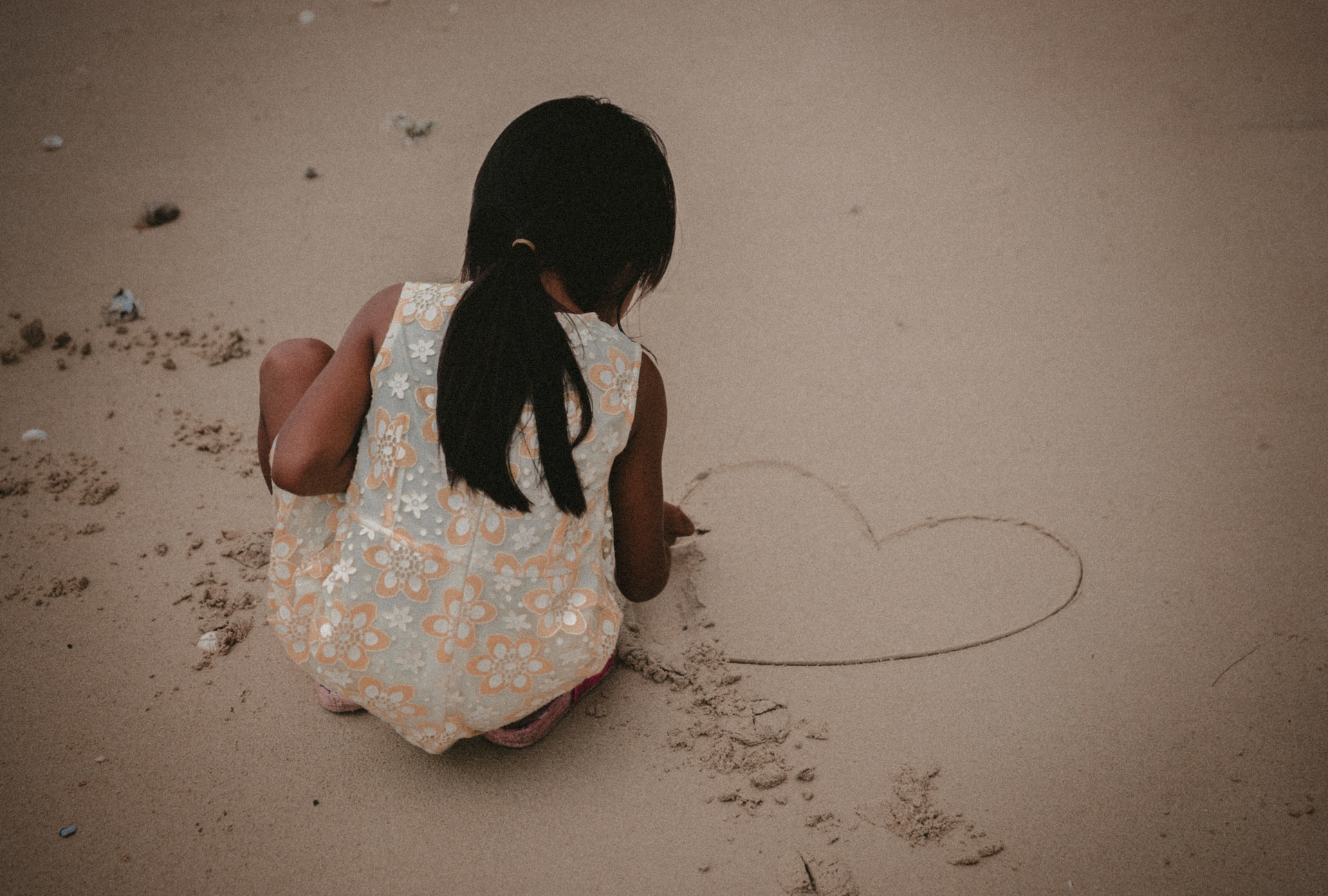
It’s about not making those who are not the same in characteristics, abilities, and preferences comply with a standard that doesn’t fit their circumstances.
With women, it’s about not making women behave exactly like men and proving their abilities in comparison to men to be treated equally.
Instead, it’s about acknowledging their existing competence without making them prove it or involving anyone else in their sovereignty.
With kids, it’s similar. But they’re in a worse position because, as kids, the resources for improving their position are less available to them than to adults, who can defend their interests on their own. (Unless they are deprived of legal capacity, but even then they have legal representatives.)
Kids rarely get legal representatives in legal proceedings (because they’re not treated as a separate side in the process) or when their interest conflict with interests of their parents/guardians.
So, when it comes to children, it’s not about making them prove their competence before you include their perspective—the competence goes without saying, unless it’s proven otherwise.
You might find interesting and helpful mu post that explores how parents should treat their children if they want them to be their true selves.
7. DENYING CHILDREN THEIR RIGHT TO PARTICIPATE
Well, this is obviously related to the previous one.
When I say “participate,” this is about participation in decision-making and expressing their views freely, where the views are given weight and taken into account according to the level of the child’s maturity and age.
Adults deny children their right to participate that is guaranteed to them through international treaty called Convention On The Rights Of The Child, usually because they don’t see and treat children as equals.
As we said previously, this means they don’t see them as competent.
This should surprise you, because even professionals who are trained for spotting to what extent children’s rights and needs are respected and protected do it.
For instance, as a segment od my Master’s thesis I’ve conducted a research that investigated how much is the child’s right to participate respected in divorce cases for children under 10, by professionals (social workers, psychologists, pedagogues, special pedagogues and jurist) from 29 cities and towns working in family protective services.
The results showed that children’s right to participation is not respected mostly due to:
- professionals’ prejudices around child’s competence which is why they don’t include children,
- as well as lack of proper training for gathering the youngest children’s views.
Than it’s no wonder that most adults aren’t properly informed on the matter or its importance!
But from now on, after you received this verified information, you will be aware that it’s your responsibility to include children in the conversation when you’re making decisions that affect them.
This doesn’t mean that they’ll bear the weight of the decision, take over, or have unilateral control.
It means they will be acknowledged as someone who’s opinion, emotions, fears, doubts and opposing matter equally in the process of decision-making that affects their lives.
The more important and the bigger the decision the more critical is that they’re included and not the opposite which, unfortunately, happens to them regularly.
Check out also:
If you found the information on the blog helpful & inspirational and you feel like giving back, you can do it by clicking the donate button after entering amount you’re comfortable with. I’ll use it to create and deliver more useful content and resources like this. Thanks for your precious contribution!
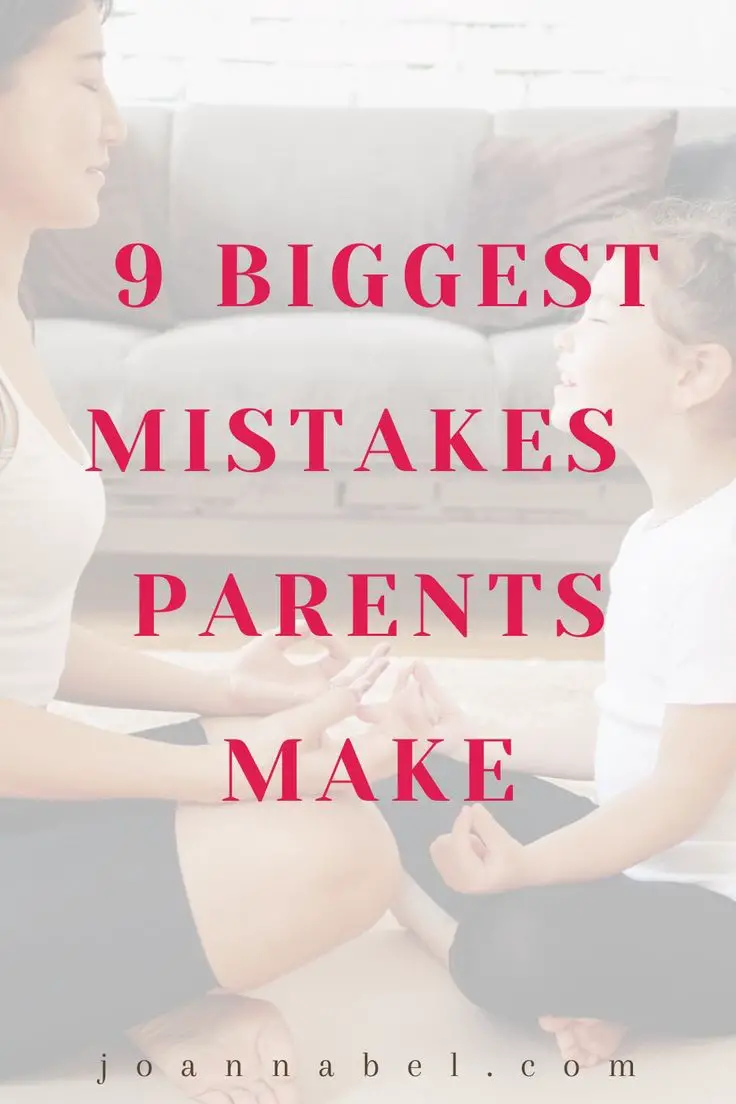
8. USING CORPORAL PUNISHMENT
The problem with corporal punishment is the same inequality problem.
It is important to avoid harsh punishment, particularly corporal punishment, when disciplining children.
And this is not true only because it is ineffective (considering this is not a discipline issue, it’s human rights, child’s right, and ethical and moral issue), but because it is disrespectful to their human dignity and rights.
Children have specific and distinct rights that must be protected at all times, and using physical punishment violates those rights.
Just as adults are protected by the law from physical punishment, children are entitled to the same protection.
Many adults continue to use corporal punishment because they operate under the ingrained belief that children are not separate individuals and do not have their own rights.
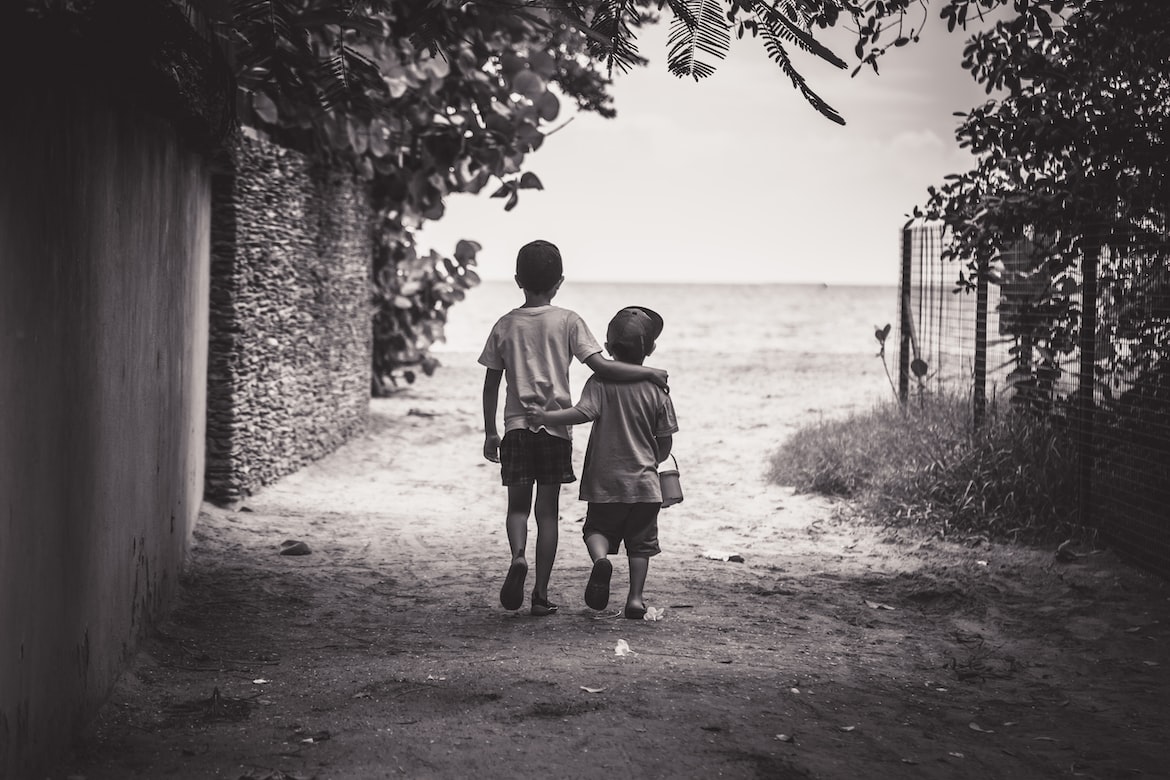
However, this is a false (and outdated) belief. Once you recognize that children are individuals with integrity and sovereignty, you will understand why physical punishment is not acceptable.
It is important to remember that children do not belong to anyone and have the same rights to autonomy as adults.
And if you’re feeling conflicted about the restriction of corporal punishment, that’s because you’re falling behind the contemporary societal standards and are still operating under the old paradigm of a child being unseparated, undivided, not sovereign, and non-existing without their role as “the parent’s child.”
If this is something you don’t like to hear, I get it, and I understand the frustration and guilt in case you’ve been one of these parents. But the priority for me in this case isn’t to just make you feel good – it’s that you hear it anyway so that I can contribute to your child’s and family’s wellbeing.
Read my post What Is The Best Way To Punish A Child, because it’ll help you understand what’s a good punishment and what is the one that must be avoided as it’s harmful for the child.
This is only for those who use punishment because this post isn’t intended to inspire you to use punishment. It’s intended to prevent harm that is being done to children when parents implement punishment inadequately.
Check out this printable and digital download as well, it’s created to help you differentiate right from wrong when implementing punishment:
-
Product on sale
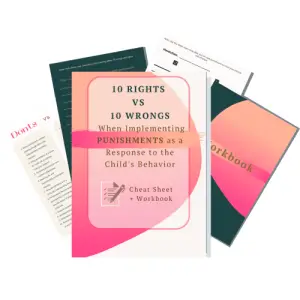 10 Rights & 10 Wrongs When Implementing PunishmentsOriginal price was: 14,00 $.9,00 $Current price is: 9,00 $.
10 Rights & 10 Wrongs When Implementing PunishmentsOriginal price was: 14,00 $.9,00 $Current price is: 9,00 $.
9. NOT SUPPORTING CHILDREN IN BECOMMING MORE INDEPENDENT AND DISREGARDING THEIR (NEED FOR) AUTONOMY, OR EXPECTING CHILDREN TO BE TOO INDEPENDENT
The problem with obstructing independence is that parents do not recognize their child as autonomous, which is why they are too controlling of their behavior, choices, and actions.
The moment when this is going to become an unbearable position for the child (and the parent) is the moment they reach adolescence.
And as a parent, you can expect that they will show symptoms of internalized (like mental health problems) or externalized problems (like behavioral problems).
If you try to increase control even more, be prepared for the problems to reach their sealing point, so this isn’t a good way to go.
But if you were the other way around (recognizing autonomy), then you’d be welcoming all their contributions while still being the person responsible for guiding, monitoring, and supporting them.
Or it can be that the parent is expecting or demanding that their child is too independent because they’re not sure how to find the right balance. Or they’re left with no other choice if they’re under a lot of pressure to manage too many things on their own without much support, which then leaves their children in a position to disregard their emotional needs and try to be helpful and responsive at all times.
This isn’t usually the parent’s fault (at least not directly), but if this is the case for you, I strongly suggest that you don’t remain too proud and ask for help or support.
If you want to help your child become more independent, I’ve got a few tips for you:
- Let them do things by themselves.
- Support them in making choices.
- Create opportunity for them to give consent
- Allow them to say no.
- Allow that they negotiate for themselves
- Create a space for them to make mistakes.
- Let them fail.
- Support them in learning to handle money.
- Teach them to question social conventions and constructs.
And if you’re curious to explore this a little more, read my post on 9 principles to follow if you want to help your child become more independent.
Considering this is closely related to helping a child become more responsible for their actions, I have another blog post that you might find helpful because it unwraps the reasons behind your child’s avoiding responsibility.
Here is the link to it. Let me know if it helps.
You may find useful:
Latest Posts:
- Special Gifts to Let Someone Know You’re Thinking of Them (13)

- 100 Ways to Challenge Yourself (Without Stretching Yourself Too Thin)

- What To Do When Your Parent Struggles With Alcohol

- How To Navigate Moving to a New Home With Your Kids

- Prenups for Young Couples (A Modern Approach)

- What Happens When You Sign A Prenup (Relationship-Wise + Legally)

Found this post helpful? If you’d like to take it with you, get it as a print-friendly pdf with no interruptions on page. Plus you’ll become a direct supporter of this blog.
FINAL THOUGHTS ON THE GREATEST MISTAKES PARENTS MAKE
Thanks so much for sticking with me until the end to hear about all 9 biggest parenting wrongdoings. That’s real dedication and commitment.
If you have any questions, leave them in the comment form, and I look forward to seeing you in my next post!
Read now:

